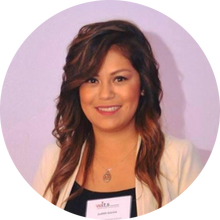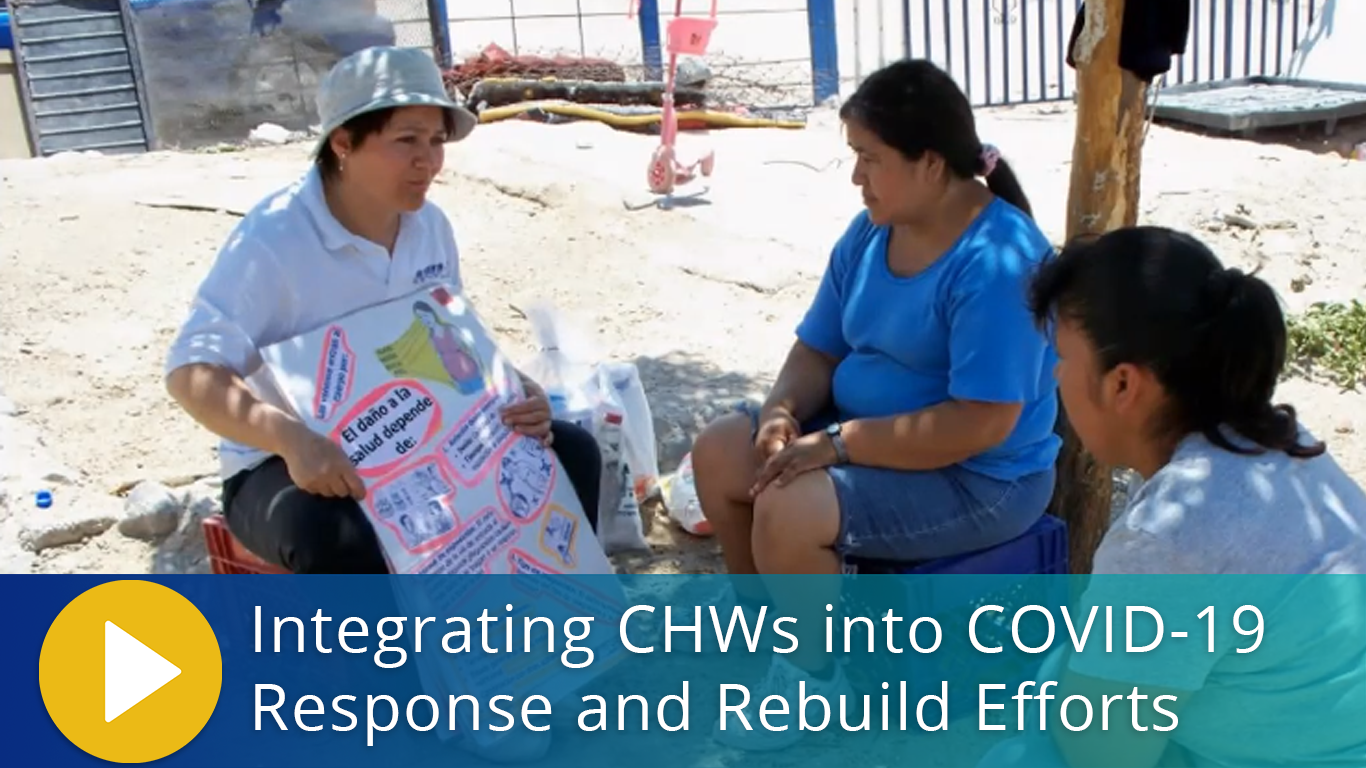
The COVID-19 pandemic has highlighted the persistent inequities in healthcare throughout American society. Community Health Workers (CHWs), as trusted members of the community and experts in community health, are critical for advancing health equity. CHWs should be engaged as necessary partners throughout several key activities of the local COVID-19 response strategy, including but not limited to contact tracing, healthcare coordination, community-based testing, vaccine readiness education, and the navigation of social resources.
The term “Community Health Worker” is an umbrella term for a variety of public health occupations including, among other titles, promotoras de salud, community health representatives, patient navigators, and lay health advisors. CHWs serve nearly every sector and represent a variety of linguistic, racial, ethnic, and geographic communities throughout the United States.
Cultural Mediation Among Individuals, Communities, and Health and Social Service Systems
CHWs build trust as necessary links between community members and the local health departments and the healthcare system, especially for communities that have been excluded from or marginalized by public health and healthcare services in the past. While CHWs are not responsible for nor capable of completely repairing systems of mistrust, their engagement is essential throughout the healing process.
Build Individual and Community Capacity
CHWs bridge local institutions by working with different agencies present in a community to promote a more comprehensive COVID-19 community health response that maximizes the utility of resources present and ensures equitable distribution to prioritize the needs of the most vulnerable.
Provide Culturally Appropriate Health Education and Information
Throughout American communities there is misinformation about the virus, widespread concerns about data privacy, and mistrust of traditional healthcare institutions among communities of color. There are also community concerns regarding negative consequences of providing their personal information to outsiders. A trusted messenger—such as a CHW—who meets people where they are and empowers them to act, is essential to building trust, a key component of any COVID-19 community outreach initiative. CHWs relay information to communities from LHDs and elevate the voices of the most marginalized to ensure community health responses are informed and equitable. CHWs also communicate proper COVID-19 health behavior in a culturally sensitive way. For example, when a CHW was called to speak with primarily immigrant workers in a fruit packing warehouse about the fear of infection spreading within the facility, they were able to train the workers on appropriate mask wearing and physical distancing protocols.
Care Coordination, Case Management, and System Navigation
Members of vulnerable communities find it especially difficult to self-isolate—due to limited work from home opportunities, a lack of housing space to safely isolate, or difficulty establishing a secure food supply—often need tailored support to follow self-quarantine guidelines. CHWs can help these individuals navigate social resources in LHDs and nonprofits to address concerns such as food insecurity, financial challenges, transportation difficulties and emotional trauma that contribute to higher risks of disease and impede recovery. For example, CHWs in the Navajo Nation (referred to as Community Health Representatives) help find food and water resources for individuals stopped at checkpoints after locally-imposed curfews. CHWs also help navigate the healthcare system, especially for patients with comorbidities, pre-existing conditions, and chronic care needs—those who are most high-risk for COVID-19. Because CHW identities reflect the diversity of the communities they serve, they have an immediate comprehension of the difficulties distinct communities face when accessing healthcare. CHWs can also continue to strengthen and maintain the healthcare system after a crisis like COVID-19 by promoting the management of chronic conditions in vulnerable populations with continuous accompaniment. As assessed by the CDC and several randomized control trials, CHWs are effective and essential healthcare workers; they are experts in community health.
Advocate for Individuals and Communities
CHWs can advocate for marginalized community members with employers and landlords to facilitate safe housing options and working conditions so that community members can remain safe and do not have to assume unnecessary risk to sustain their livelihoods during COVID-19. For example, that same CHW from the fruit packing plant advocated for the employees who did not have paid sick leave and were afraid to violate mandated work hours, which eventually ensured that all workers received a COVID-19 test at the owner’s expense.
Conduct Outreach
While contact tracing and testing is functionally performed to track and prevent the spread of disease, the activity is fundamentally about community relationships. When a tracer conducts outreach, they represent the LHD’s concern to guard the health of the community. Without serious engagement of CHWs in COVID-19-related community outreach activities, LHDs will likely fail to reduce health inequities because LHD representatives will not be trusted and largely unable to provide holistic support.
Judith is a community health worker based in the Minneapolis - St. Paul area. She had been working in the field for eight years when the COVID-19 pandemic changed her life.
Despite being homebound during a stay-at-home order, Judith continued to help her community by providing over-the-phone interpretation, referrals and information about health insurance, and connections to other resources. She also helped them build healthy routines during the shut down with at-home activities, healthy meal ideas and 30 minutes of exercise. "These concerns spoke to the high level of stress and anxiety that people have faced this part year," she said.
One of her clients had Type 2 Diabetes and could not keep his medical appointments because he did not have transportation or medical insurance. He used his savings, and eventually credit cards, to pay for life-saving medication, yet he faced dental and vision problems due to his deteriorating health. He was running out of options.
Judith stepped in to help him schedule appointments and access health insurance, and she even filled his prescriptions and delivered them to his home. He was able to get his diabetes under control and return to work. "It is heartwarming to be a voice for the voiceless," she said. "I am the community I serve."
This section was adapted from the Playbook for Local Public Health Department Strategies in the United States created by the Community-Based Workforce Alliance.
Webinar: Integrating CHWs into Local Public Health COVID Response and Rebuild Efforts
Learn about the innovative ways state and local public health departments employ community health workers (CHWs) to meet the diverse needs of their communities during and after COVID-19.
Watch now
passcode: so36Y^0*
Define their role
Define the role of the CHW broadly, and include a range of activities (social support, advocacy, navigation, etc.). Consult nationally recognized CHW Core Consensus Project roles, qualities, skills and competencies. Align with state recognized credentialing, certification or training standards.
Recruit strong candidates
Recruit in a grassroots way that draws from the communities to be served, and consider involving other CHWs in the selection process. Ensure hiring rubrics prioritize qualities essential for the role (e.g. trust-building traits, empathy, problem-solving skills, knowledge of the local community).
Provide robust training and professional development
Include extensive practicum time in your training, and offer ongoing professional development. Invite a CHW to co-create and co-lead training. Work with local and state CHWs, CHW associations, and organizations with a history of providing CHW training to identify the best available training curricula.
Ensure their safety and wellbeing
Provide necessary supplies and protective equipment, and prioritize self-care, mental health, and burnout prevention. Consult regularly with CHWs to assess equipment and supplies needed to ensure safety and provide the best care. Ensure compliance with OSHA workplace guidelines for COVID-19.
Hire effective supervisors
Supervisors should be experienced CHWs or have a background in community/social services. Screen supervisors using criteria such as: understanding and importance of the CHW role, familiarity with the communities CHWs will be working in, and understanding the lived experience of community members.
Provide competitive compensation
CHWs should be compensated at a competitive rate for all work they do and should given employee benefits. Guarantee CHWs a living wage, using the MIT Living Wage Calculator. Advocate for moving from fee-for service to value-based payment and integrating CHWs into the operating budget.
Integrate CHWs with health systems
Healthcare professionals are important champions for CHW involvement. Develop personal contacts between CHWs and individual members of local health and social services systems.
Develop community partnerships
CHWs work best when they can engage with CBOs, departments of social services, and faith-based institutions. Develop personal contacts between CHWs and individual members of CBOs and other community institutions. Work with local and state CHW associations to identify these institutions.
Invest in their careers
Guaranteee employment for CHWs after the COVID-19 contract has expired. Consider identifying CBOs, community health centers or hospitals that can employ CHWs to respond to other health issues after COVID-19 activities are over; identify additional funding through the LHD or SHD to sustain program activities.

